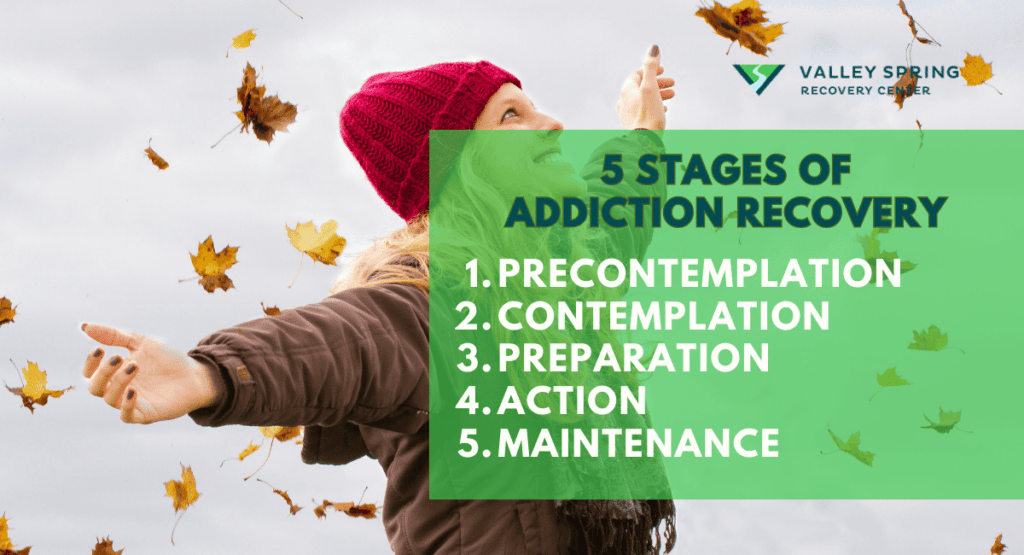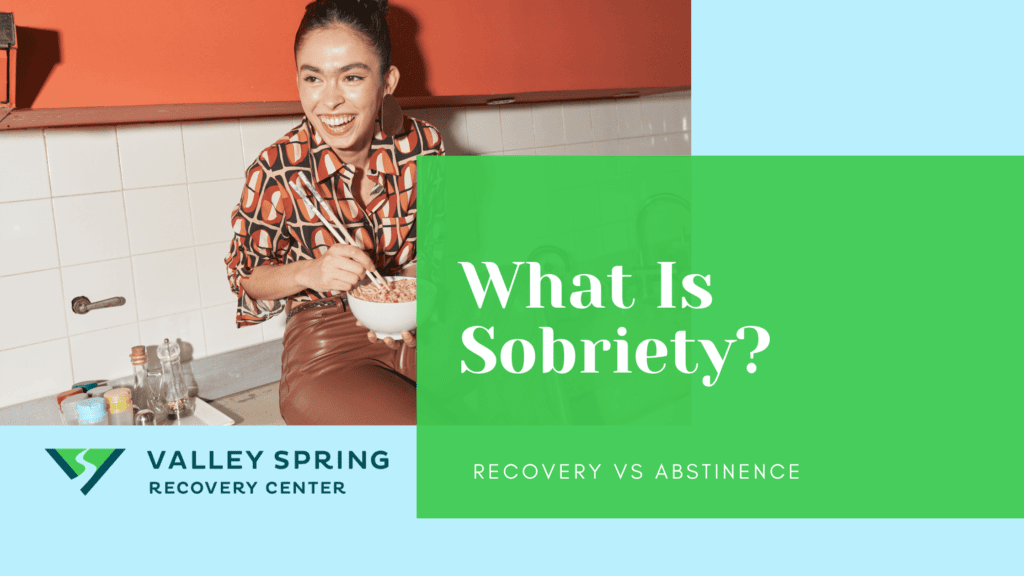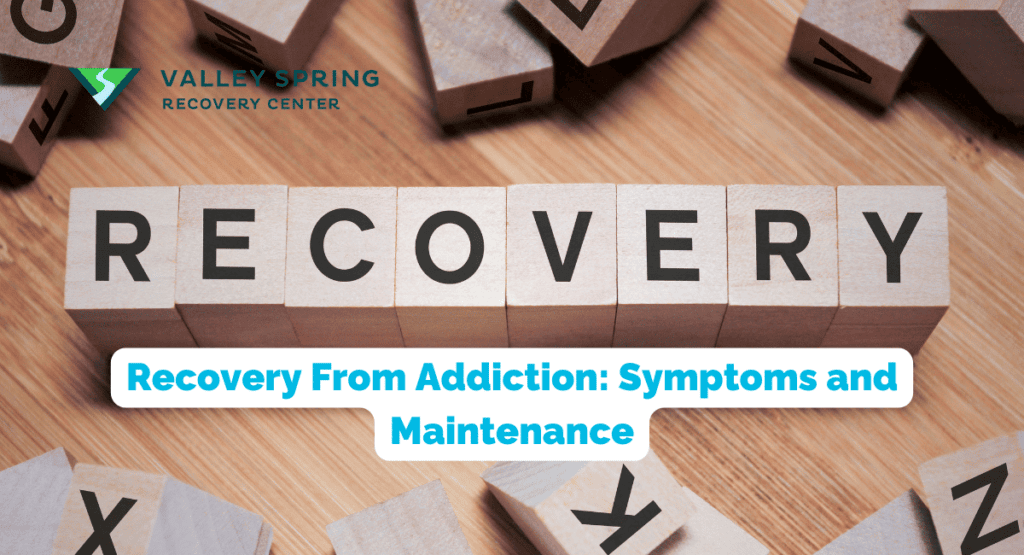The journey of addiction recovery requires self-reflection, self-awareness, and a commitment to personal growth. It involves seeking professional help, building a strong support system, making behavioral and lifestyle changes, and mastering relapse prevention strategies. All these are broken down into the five stages of addiction recovery.
From the pre-contemplation stage to maintenance, each stage represents a significant milestone on the path to lasting recovery. It is important to recognize that progress through these stages is not always linear, and individuals experience setbacks or cycles of change. However, with determination, support, and evidence-based interventions, individuals can achieve long-term sobriety and lead fulfilling lives free from the grip of addiction.
What is Addiction Recovery?
Addiction recovery is the journey of overcoming substance use disorders or behavioral addictions. It is one of the six stages of drug addiction where the former addict is now abstinent and engaged in active participation in sobriety and treatment. Addiction recovery involves acknowledging the problem and seeking professional help, developing a treatment plan, and making behavioral and lifestyle changes to support sobriety or abstinence.
This process includes detoxification, therapy, and the cultivation of healthy coping mechanisms. It also requires building a strong support system, preventing relapse through ongoing vigilance, and promoting personal growth and well-being.
In addiction recovery, individuals commit to a path of change, resilience, and self-care. They work towards breaking free from the cycle of addiction, maintaining long-term sobriety, and finding fulfillment and purpose in life. It is a transformative journey that requires dedication, ongoing support, and a commitment to personal growth.
What are the Six Stages of Addiction Recovery?
The Transtheoretical Model of Change, developed by Prochaska and Velicer, describes the six stages of addiction recovery as pre-contemplation, contemplation, preparation, action, maintenance, and termination, highlighting a nonlinear journey through behavioral change.
- Pre-contemplation
- Contemplation
- Preparation
- Action
- Maintenance
- Termination
The Transtheoretical Model of Change, also known as the Stages of Change model, was initially developed to understand and facilitate behavior change in the context of addiction, but it has since been applied to various areas of behavioral health.
The model suggests that individuals go through a series of stages when making changes in their behavior. These stages are not linear, and individuals move back and forth between them.
Some versions of the model include a sixth stage called termination. In this stage, individuals have successfully eliminated the addictive behavior, and they no longer feel tempted or at risk of relapse.
Stage 1: The Precontemplation Stage
In the pre-contemplation stage of the Transtheoretical Model of Change, individuals do not consider changing their addictive behavior, often due to a lack of awareness, denial, defensiveness, resistance to information, and a lack of motivation for change.
Characteristics of the Pre-contemplation stage are listed below:
- Lack of awareness: Individuals in the pre-contemplation stage lack awareness of the impact their addictive behavior has on their lives and the lives of others. They may not recognize the signs of addiction or may minimize the severity of the problem.
- Denial and defensiveness: People in this stage often exhibit denial and defensiveness when confronted with their addictive behavior. They may downplay the negative consequences and resist suggestions for change. They may attribute their behavior to external factors or make excuses to justify their actions.
- Resistance to information: Individuals in the pre-contemplation stage may actively avoid or ignore information related to their addiction. They may resist seeking information about the consequences, treatment options, or available support systems. They may also avoid discussions about their addiction with loved ones or healthcare professionals.
- Lack of motivation: Lack of motivation is definitive in this stage; individuals do not recognize recovery benefits and view the costs of change as too high, compounded by low self-efficacy and a strong doubt in their capacity to surmount their addiction.
A good example is someone who’s in the pre-contemplation stage regarding their alcohol addiction is as follows:
An illustrative case of someone in the pre-contemplation stage of alcohol addiction is a high-functioning alcoholic who has engaged in heavy drinking for years. This individual does not acknowledge the severe consequences of their drinking on relationships, work performance, and health, often attributing these issues to external factors or minimizing their importance.
Upon receiving expressions of concern or suggestions for help from friends or family, the individual becomes defensive, insisting on their ability to manage their drinking and denying any problem, claiming it as merely a form of stress relief.
In this stage, the individual shows no motivation to change, continuing to view alcohol as a source of comfort, blind to the benefits of recovery.
Approaching individuals in the pre-contemplation stage demands empathy, understanding, and non-confrontational communication. Pressuring them for change or bombarding them with information typically results in resistance and a deeper commitment to their existing mindset. Offering non-judgmental support, building trust, and slowly increasing awareness of the consequences of their addiction are crucial steps in guiding them towards the next stage of change, enhancing readability and authority.
Stage 2: The Contemplation Stage
Addictive behavior signifies a critical phase in an individual’s journey toward recovery. At this juncture, the substance user is contemplating a significant change, yet might wrestle with doubts about proceeding.
The Characteristics of the Contemplation Stage are outlined as follows:
- Ambivalence: Individuals at this stage often grapple with mixed feelings. They recognize the detrimental impacts of their addiction but face internal conflicts over relinquishing it. They consider both the adverse effects of their addictive behavior and the potential advantages of recovery.
- Increased awareness: Awareness about the severity and implications of their addiction heightens in this stage. Individuals might gather information, communicate with close ones, or reflect deeply, gaining a more profound understanding of the physical, emotional, and social consequences of their addictive habits.
- Weighing pros and cons: Engaging in an evaluative process, individuals contemplate the merits of changing their behavior. Recovery benefits like enhanced health, relationships, and overall well-being are considered, alongside the challenges and perceived losses linked to abandoning their addictive behavior.
- Seeking information and support: Actively pursuing knowledge about addiction, recovery pathways, and support mechanisms becomes common. Research into treatment programs, discussions with healthcare providers, or advice from those who have overcome similar challenges are sought to inform decision-making.
- Increased self-reflection: A period marked by introspection and self-examination, individuals assess their values, life priorities, and addiction’s role. Exploring motivations and underlying factors contributing to their addictive behavior is pivotal.
During this contemplative stage, the support received from friends, family, or addiction specialists is crucial. A safe and empathetic environment, where individuals can freely share their thoughts and feelings, significantly aids in navigating this complex phase.
Stage 3: The Preparation Stage
Individuals at this stage have solidified their resolve to combat addiction, actively gearing up to initiate tangible measures toward recovery. Their readiness is marked by deliberate planning and goal-setting to support their journey to sobriety.
Characteristics of the Preparation Stage include:
- Commitment to change: At this juncture, individuals are fully dedicated to altering their addictive behaviors. Acknowledging the detrimental effects of their addiction, they are resolved to take decisive steps towards recovery.
- Setting goals: This stage involves the articulation of concrete, achievable goals pertaining to recovery. These objectives may be immediate or future-oriented, encompassing actions like attending counseling sessions, engaging with support communities, or adopting strategies to manage urges and triggers effectively.
- Collecting information: Engaged in a proactive quest for knowledge, individuals explore various treatment methodologies, recovery frameworks, and support mechanisms. This research is guided by a desire to find options that best match their recovery aspirations and personal circumstances.
- Building support networks: Recognizing the value of communal support, individuals begin to forge or strengthen relationships with peers, family, and potential mentors who can offer motivation, advice, and a sense of accountability. Professional support from healthcare providers or addiction specialists is also sought to enrich this network.
- Removing barriers: Anticipating potential hurdles in their recovery path, individuals take preemptive measures to mitigate these challenges. Efforts may include lifestyle adjustments to eliminate triggers, severing connections with enablers of addictive behaviors, or addressing concurrent mental health conditions.
The Preparation Stage is critical for embedding the commitment to recovery within a structured framework of actionable plans and supportive relationships. Providing affirmations, resources, and consistent support during this phase is pivotal in equipping individuals with the confidence and tools required for effective action and sustained recovery.
Stage 4: The Action Stage
In this stage, individuals have taken concrete steps to modify their addictive behavior and are actively engaged in the process of change. They are implementing strategies, making behavioral adjustments, and working towards achieving their goals of recovery.
Characteristics of the Action Stage of addiction recovery are listed below:
- Behavior modification: Individuals in the action stage are actively modifying their addictive behavior. They engage in strategies such as abstaining from substance use, practicing healthier coping mechanisms, or adopting new habits and routines to replace addictive behaviors.
- Seeking support: People in this stage actively seek and utilize support systems to aid their recovery. They attend therapy sessions, participate in support groups, or engage in counseling to address underlying issues and gain tools for maintaining their new behaviors.
- Overcoming challenges: Individuals in the action stage face challenges and obstacles that test their commitment to change. They encounter triggers, cravings, or situations that tempt them to revert to their addictive behavior. It requires resilience, determination, and coping skills to overcome these challenges and stay on track with their recovery goals.
- Building new skills: People in this stage focus on developing and strengthening the skills necessary for sustained recovery. This includes learning effective communication techniques, stress management strategies, or healthy coping mechanisms. Skill-building enhances their ability to navigate challenging situations and maintain their progress.
- Monitoring progress: Individuals actively monitor and evaluate their progress during the action stage. They keep track of milestones, successes, and setbacks to gain insights into their recovery journey. Regular self-reflection helps them stay motivated, make adjustments as needed, and celebrate their achievements.
Note that challenges are a part of the action stage, and individuals must overcome them to maintain their recovery. They encounter situations that tempt them to return to the substance of abuse, face social pressure, or experience intense cravings. They need a support system, coping skills, and a newfound determination to navigate these challenges successfully.
Stage 5: The Maintenance Stage
The maintenance stage is the fifth stage of the Transtheoretical Model of Change published by Prochaska JO, Velicer WF in their 1997 research study. In this stage, individuals have successfully modified their addictive behavior and are focused on maintaining their progress over the long term. The primary objective of the maintenance stage is to prevent relapse and sustain the positive changes made during the recovery process.
Characteristics of the Maintenance Stage:
- Consolidating new behaviors: Individuals in the maintenance stage work to consolidate the changes they have made during the action stage. The new behaviors and coping strategies become ingrained habits and are consistently practiced to support ongoing recovery.
- Relapse prevention: People in this stage are vigilant about identifying and managing potential relapse triggers. They proactively develop strategies to cope with high-risk situations and implement healthy alternatives to their addictive behaviors. They engage in ongoing therapy, attend support group meetings, or utilize other resources to reinforce their relapse prevention skills.
- Long-term goal setting: Individuals in the maintenance stage set and pursue long-term goals related to their recovery. These goals focus on personal growth, improved relationships, career advancement, or overall well-being. Setting meaningful goals helps to maintain motivation and provides a sense of purpose in the recovery journey.
- Self-care and healthy lifestyle: People in this stage prioritize self-care and adopt a healthy lifestyle to support their ongoing recovery. This includes maintaining regular exercise, practicing stress management techniques, prioritizing sleep, and adopting a balanced diet. Taking care of their physical, emotional, and mental well-being is essential for long-term maintenance.
- Continued support: Individuals in the maintenance stage recognize the importance of ongoing support in sustaining their recovery. They continue attending therapy sessions or support group meetings as needed. They also actively engage in a supportive social network that understands and encourages their recovery efforts.
In the maintenance stage, individuals celebrate their achievements and milestones while remaining mindful of the potential challenges that arise. They continue to prioritize their recovery, monitor their progress, and make adjustments as needed.
With ongoing commitment, support, and a focus on long-term well-being, individuals can successfully sustain their recovery and lead fulfilling lives free from addiction.
How Does the Contemplation Stage Differ from Pre-contemplation?
In the contemplation stage, individuals acknowledge they have a problem and start to think seriously about addressing it. Unlike the pre-contemplation stage, where there’s denial or ignorance about the addiction, contemplation involves weighing the pros and cons of their behavior and the potential change. It’s a stage of ambivalence where individuals recognize the benefits of change but are still hesitant to commit to action.
What Involves the Preparation Stage of Addiction Recovery?
The preparation stage is a transitional phase where the decision to change has been made, and initial steps are being planned or taken. This could involve seeking information about treatment, discussing change with loved ones, or setting realistic goals. Preparation is about creating a tangible plan of action, which might include identifying support networks or deciding on a treatment approach.
Can You Explain the Action Stage in the Context of Addiction Recovery?
The action stage is where individuals actively implement their plan to change addictive behaviors. This often involves tangible steps such as attending counseling sessions, participating in a rehabilitation program, or using other treatment methods. It’s a phase of direct effort and commitment to change, requiring significant time and energy to modify behaviors and implement strategies to avoid relapse.
What is the Role of the Maintenance Stage in Sustaining Recovery?
In the maintenance stage, individuals work to sustain the changes made during the action stage. This involves continued commitment to the new behavior, avoiding triggers, and employing coping strategies to prevent relapse. The maintenance stage is crucial for long-term recovery from addictive behaviors, as it focuses on integrating the new behavior into everyday life and addressing challenges that arise.
How Does the Transtheoretical Model of Change Address Relapse?
The Transtheoretical Model acknowledges that relapse can be a part of the change process. Relapse is viewed not as a failure but as an opportunity for learning and growth. It’s understood that individuals might cycle through the stages several times before achieving sustained change. Each relapse is seen as a chance to understand more about the addiction and the strategies needed for long-term change.
What is the Termination Stage in the Context of Addiction Recovery?
The termination stage is an additional stage in some versions of the model, representing the point where the individual no longer feels tempted by the addictive behavior and the risk of relapse is minimal. Achieving this stage means that the individual has fully integrated the new behavior and feels confident in their new lifestyle without the addiction.
How Can Loved Ones Support Someone in the Different Stages of Recovery?
Support from loved ones is crucial in all stages of recovery. In the early stages, it involves encouraging the individual to recognize their addiction and consider change. During the preparation and action stages, practical support, like helping to find treatment options, is valuable. Throughout the maintenance stage, ongoing emotional support, understanding, and encouragement are vital to help sustain changes.
Are There Specific Treatment Approaches Recommended for Different Stages of Recovery?
Optimal treatment approaches vary depending on the stage of recovery. In the early stages, motivational interviewing and awareness-raising interventions can be effective. In the action and maintenance stages, structured treatments like cognitive-behavioral therapy, support groups, and medication-assisted treatment might be more appropriate. Personalizing treatment to the individual’s stage of change can improve outcomes.
Stage-matched interventions are tailored strategies designed to match the individual’s current stage of change. They have shown effectiveness in improving recruitment, retention, and progress in health behavior change programs and can help to get an addict who has relapsed to consider recovery again.
How Can Individuals Self-Monitor Their Progress and Sobriety Through the Stages of Recovery?
Self-monitoring involves regular reflection on personal progress, recognizing triggers, and evaluating coping strategies. Keeping a journal, setting short-term goals, and seeking feedback from therapists or support groups are effective ways to self-monitor sobriety. It’s about being mindful of one’s behaviors, emotions, and the situations that might influence the risk of relapse.
What is the Transtheoretical Model of Health Behavior Change?
The Transtheoretical Model (TTM), as described by Prochaska and Velicer (1997), is a framework designed to understand the progression through six stages of change when an individual decides to modify their health behaviors. It encompasses ten processes of change, alongside decisional balance, self-efficacy, and temptations, to influence movement through these stages.
The six stages of change in the Transtheoretical Model are listed below:
- Precontemplation: Not yet acknowledging a need for change.
- Contemplation: Recognizing the need for change but not yet ready to start.
- Preparation: Ready to start changing soon and planning steps.
- Action: Actively making lifestyle changes to behavior.
- Maintenance: Sustaining the change over time and preventing relapse.
- Termination: The change has been fully integrated, and relapse is no longer a concern.
What does research say about the distribution of people across the stages of change?
Prochaska and Velicer’s (1997) research on at-risk populations suggests a distribution pattern where roughly 40% are in precontemplation, 40% in contemplation, and 20% in preparation, providing insight into the readiness of individuals to engage in behavior change.
| Stage of Change | Percentage of Individuals |
|---|---|
| Precontemplation | 40% |
| Contemplation | 40% |
| Preparation | 20% |
How effective are computer-based interventions in getting substance users to exhibit changes?
Computer-based interventions, especially when individualized and interactive, have shown promising outcomes in facilitating health behavior change. They can be enhanced further with the addition of personalized counseling.
How is recovery from prescription pill addiction more difficult than recovering from illegal drug addiction?
Recovering from prescription pill addiction can present unique challenges, but whether it is more difficult than recovering from illegal drug addiction depends on various factors. Prescription opioids for pain management can lead to addiction similar to illicit opioids. This is true for stimulant prescriptions like Adderall or benzodiazepines. The difficulty in recovery often hinges on factors like the length of use, dosage, individual health, and the presence of underlying conditions, rather than the legal status of the drug.
One aspect that can make recovery from prescription pill addiction like hydrocodone addiction challenging is its legal and medical context. Individuals have started taking hydrocodone as a legitimate prescription for pain, which can blur the lines between appropriate use and addiction. This medical legitimacy can sometimes delay the recognition of a developing addiction, compared to illicit drugs where any use is typically recognized as problematic.
Moreover, the withdrawal symptoms and psychological dependence associated with prescription pills can be intense, similar to those experienced with illegal drugs. However, the perception of prescription drugs as being safer can lead to underestimating the addiction’s severity.
On the other hand, illegal drug addiction often involves additional risks, such as impure substances and the hazards of acquiring drugs illegally, which can complicate the addiction and recovery process.
Ultimately, the recovery journey is highly individual. Both prescription pill addiction and illegal drug addiction require comprehensive treatment approaches, including medical intervention, counseling, and support groups, tailored to the individual’s specific needs and circumstances.
Ben Fisher
All author postsShare This Post







